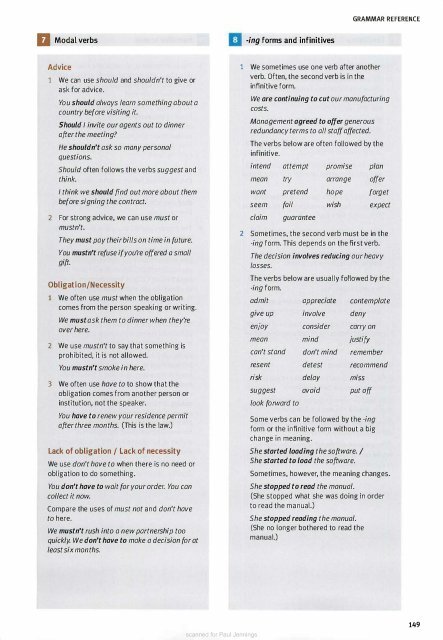Market+Leader+Intermediate+3rd+edition+SB
Market+Leader+Intermediate+3rd+edition+SB
Market+Leader+Intermediate+3rd+edition+SB
- No tags were found...
You also want an ePaper? Increase the reach of your titles
YUMPU automatically turns print PDFs into web optimized ePapers that Google loves.
GRAMMAR REFERENCEII Modal verbsII -ing forms and infinitivesAdvice1 We can use should and shouldn't to give orask for advice.Yo u should always learn something about acountry before visiting it.Should I invite our agents out to dinnerafter the meeting?He shouldn't ask so many personalquestions.Should often follows the verbs suggest andthink.I think we should find out more about thembefore signing the contract.2 For strong advice, we can use must ormustn't.They must pay their bills on time in fu ture.You mustn't refuse if you're offered a smallgift·Obligation/Necessity1 We often use must when the obligationcomes from the person speaking or writing.We must ask them to dinner when they'reover here.2 We use mustn't to say that something isprohibited, it is not allowed.Yo u mustn't smoke in here.3 We often use have to to show that theobligation comes from another person orinstitution, not the speaker.Yo u have to renew your residence permitafter three months. (This is the law.)lack of obligation / lack of necessityWe use don't have to when there is no need orobligation to do something.Yo u don't have to wait for your order. Yo u cancollect it now.Compare the uses of must not and don't haveto here.We mustn't rush into a new partnership tooquickly. We don't have to make a decision fo r atleast six months.1 We sometimes use one verb after anotherverb. Often, the second verb is in theinfinitive form.We are continuing to cut our manufacturingcosts.Management agreed to offer generousredundancy terms to all staff affected.The verbs below are often followed by theinfinitive.intend attempt promise planmean try arrange offerwant pretend hope forgetseem fail wish expectclaimguarantee2 Sometimes, the second verb must be in the·ing form. This depends on the first verb.The decision involves reducing our heavylosses.The verbs below are usually followed by the·ing form.admit appreciate contemplategive up involve denyenjoy consider carry onmean mind justifycan't stand don't mind rememberresent detest recommendrisk delay misssuggest avoid put offlook fo rward toSome verbs can be followed by the ·ingform or the infinitive form without a bigchange in meaning.She started loading the software. /She started to load the software.Sometimes, however, the meaning changes.She stopped to read the manual.(She stopped what she was doing in orderto read the manual.)She stopped reading the manual.(She no longer bothered to read themanual.)scanned for Paul Jennings149


